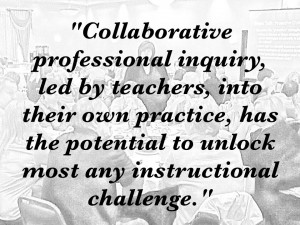Photo in courtesy of https://www.flickr.com/photos/7815007@N07/13983341233/in/photostream/
Professional development (Pro-D) is a “must do” for educators. It is important that we, educators, keep ourselves inline with the changing world, the changing curriculum, the changing pedagogy and any current educational issues. There are approximately six Pro-D days scheduled in the school year, to provide learning opportunities to educators. Teachers might attend a workshop, or do a self-directed Pro-D activity such as working on an action research, or reading academic articles, etc. Pro-D became a passive experience, and the effectiveness is questionable. Please do not get me wrong, I am not saying that attending a workshop or doing self-directed Pro-D activity individually are not effective. If the topic and issue addressed in workshop or self-directed Pro-D fits your need or the challenges that you are facing, it is worthwhile. However, I do not believe that “one size fits all” when it comes to Pro-D. Students’ learning is our ultimate goal, and I think it should be the drive of educators’ Pro-D so that our Pro-D is more practical and worthwhile. I hope to find a Pro-D format that is customized to the needs of any particular educator, or school community. When I came across “collaborative teachers inquiry,” it seems to be able to do the trick.
I like the answer of one of the interviewed teachers in the video: Why not? Why not give this new Pro-D format a try? As we encourage our students to learn collaboratively through inquiry, why not we do it ourselves? With a first-handed experience of collaborative inquiry, teachers will be able to understand and facilitate collaborative inquiry among his/her students.
My final project is to create a video to “promote” collaborative inquiry as an in-school Pro-D format. Up to date, I have decided the following contents of the video:
- Why should we do collaborative inquiry? (This would be my rationale as above)
- Using Edcamp as a reference, explain what the schedule of a collaborative inquiry Pro-D day would looks like.
- Suggest follow-up event(s) after the Pro-D day, for example, after school gatherings for updates.
My original plan is to advocate collaborative inquiry to colleagues. However, during my planning process, I thought the video could be designed for a broader range of audiences. As we always encourage students to learn and inquiry collaboratively, if I change content #1 from explaining my rationale to explaining collaborative inquiry and its benefits in general, the video could be used for students, or even parents advisory committee (PAC) to address concerns in school community. But if I do so, my project’s goal will become advocating collaborative inquiry in general, rather than aiming to make a change in our Pro-D practice. What should I do? Should I, or should I not make such a change in content? Please help, my PLN’s colleagues!
References:
Marcinek, Andrew. “Edcamps: Remixing Professional Development.” Eutopia. 19 Mar. 2014. Web. 20 Nov. 2015. <http://www.edutopia.org/blog/edcamps-remixing-profesional-development-andrew-marcinek>.
“System Leaders and Collaborative Inquiry.” Capacity Building K-12 (2015). Queen’s Printer for Ontario. Web. 20 Nov. 2015.
Link: http://www.edu.gov.on.ca/eng/literacynumeracy/inspire/research/CBS_SystemLeaders.pdf


This is a good post that outlines your key goals and thinking around your vision and who it is for. My opinion is that the wider the audience, the better, with more opportunities for collaboration, community support, and engaged students. By expanding your presentation to include a larger audience in your school community I think you are creating a bigger better opportunity for change and also supporting more people, creating a better rationale for the Teacher-Librarian role as a central key role in your school community.
Thank you, Aaron, for your advice. The more I think of it, the more I lean towards doing a general presentation to include larger group of audience. I’m still fine tuning the content of my presentation, hopefully it won’t turn out to be too “general”.
Great idea Jackie! I also like your idea of creating a general rationale that could be used for a variety of different groups… You can always tweak your actual presentation to reflect each group, so when you do present to teachers, you can still talk about your school’s Pro D activities in that context and focus on making changes to make it more engaging and effective. Good luck, I look forward to seeing it!